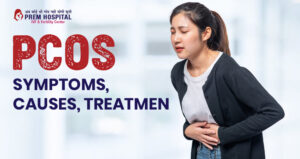
Polycystic Ovary Syndrome (PCOS) is a common endocrine disorder that affects individuals with ovaries, particularly during their reproductive years. PCOS is often misunderstood and can have significant implications for a person’s overall health. Let’s delve into the definition, symptoms, causes, and potential solutions for this complex condition.
**Definition:**
PCOS is characterized by hormonal imbalances, with elevated levels of androgens (male hormones) in individuals with ovaries. These hormonal irregularities can disrupt the normal menstrual cycle and lead to the growth of small cysts on the ovaries.
**Symptoms:**
1. Irregular Menstrual Cycles: One of the hallmark signs of PCOS is irregular periods, which may be infrequent or absent.
2. Hyperandrogenism: Elevated levels of androgens can result in symptoms such as acne, hirsutism (excess facial or body hair), and male-pattern baldness.
3. Polycystic Ovaries: Although the name suggests the presence of cysts, these are actually small follicles that accumulate on the ovaries, often detected through medical imaging.
**Causes:**
The exact cause of PCOS remains elusive, but several factors contribute to its development:
1. **Genetics:** There is a strong genetic component, with PCOS often running in families.
2. **Insulin Resistance:** Insulin resistance, where the body’s cells don’t respond effectively to insulin, is common in individuals with PCOS. This can lead to increased insulin production, contributing to elevated androgen levels.
3. **Inflammation:** Chronic low-grade inflammation has been associated with PCOS and may exacerbate symptoms.
**Solutions:**
1. **Lifestyle Modifications:** Healthy lifestyle choices are foundational. Regular exercise and a balanced diet can help manage weight, reduce insulin resistance, and alleviate symptoms.
2. **Medications:** Hormonal contraceptives can regulate menstrual cycles, while anti-androgen medications can address symptoms like acne and excess hair growth.
3. **Insulin-Sensitizing Medications:** For those with insulin resistance, medications like metformin may be prescribed to improve insulin sensitivity.
4. **Fertility Treatments:** Individuals trying to conceive may explore fertility treatments, such as ovulation induction.
**Conclusion:**
PCOS is a multifaceted condition that requires a comprehensive approach to management. Understanding its definition, recognizing symptoms, identifying potential causes, and exploring various solutions are crucial steps toward improving the quality of life for those affected by PCOS. Consulting with healthcare professionals and adopting a personalized, holistic approach can empower individuals to effectively manage this enigmatic syndrome.






